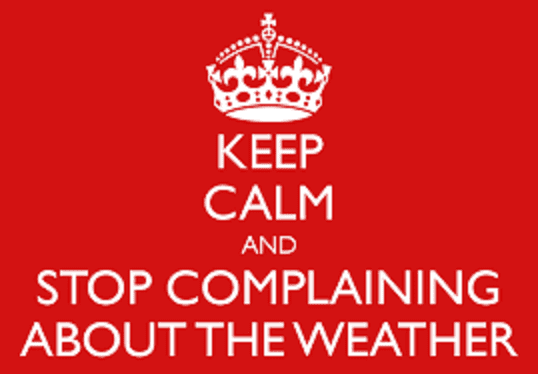I am not a complainer by nature. My wife, my family, and my friends would attest to this. I’m an optimist at heart, a glass-half-full sort of guy. I’m like the kid from the joke who explains why he is digging through a pile of horseshit by saying that “there must be a pony in here somewhere.” I will admit that my native optimism has been challenged more seriously than usual over the past year—but most of the time I manage to stay attitudinally on top of things. When my colleagues at virtual Friday Happy Hour on Zoom compete for the title of “Person who had the shittiest week,” I don’t participate. Because I’m healthy, I’m sheltered in place with my best friend and the love of my life (who happen to be the same person), we are both working, and things are good. I have little to complain about.

Except for the weather. I moan, complain, and bitch about the weather regularly, whenever it is behaving contrary to my plans and expectations. After a snow event a few days ago, we have yet to see the sun. I don’t like that. In a couple of months, when I’m hankering to get outside on my bike, I’ll undoubtedly be complaining about the wind. I can ride in relatively cool temperatures (as long as it’s about 40 degrees), but I hate riding in the wind. A 30-mile-per-hour “breeze” (as weather.com calls it) makes at least 25% of my usual bike riding circuit difficult. And as every serious biker knows, it’s worse than that, since no matter what direction you are riding a bike in, the wind is always in your face.
I know something about wind. I spent four years of my life during the 1980s in Laramie, Wyoming, which is pretty much the same as spending four years living on a large table top, with large mountains in the distance, at 7500-foot elevation with 30-50 mph winds blowing 365 24/7. Good times. So, my interest was piqued when I read the following passage from Montaigne’s “Of experience,” the final essay of his Essais that was the reading assignment for the last Zoom meeting of the semester in my Honors colloquium last semester:
I, who boast of embracing the pleasures of life so assiduously and so particularly, find in them, when I look at them minutely, virtually nothing but wind.
That hardly sounds like good news. No one wants to be a windbag, and it’s possible that Montaigne is being even more critical—as in “breaking wind” or flatulence—toward the end of his life as he compiles his unique list of “my favorite things.” But he continues the thought:
But what of it? We are all wind. And even the wind, more wisely than we, loves to make a noise and move about, and is content with its own functions, without wishing for stability and solidity, qualities that do not belong to it.
This is a creative expression of one of Montaigne’s most consistent and important insights: Human beings are not made for certainty, nor even for stability. Every fixed point that we seek to establish in our lives, whether intellectual or emotional, relational or solitary, turns out to be provisional. And that, Montaigne insists, is a good thing. He recommends that we embrace our windy essence and our provisional, ever-changing nature rather than fighting against it.
For the past year, we have all found ourselves surrounded by uncertainty and open-endedness, a reality in which virtually everything we thought we could depend on has been shaken to its core. Despite Montaigne’s advice, many are seeking stability and certainty wherever they think it might be found. Faith and religion are likely sources—or are they? A brief foray into the scriptures provides evidence that the divine is, at least on occasion, as variable and “windy” as we are.
Consider for instance, the second verse of Genesis in the Jewish scriptures, where we are told that when God created the heavens and the earth, “the Spirit of God (ruach) was hovering (brooding, sweeping) over the face of the waters.” Ruach means “spirit,” “breath,” or “wind”—when applied to God, it means divinely creative activity. Creativity always involves change, unpredictability, and mystery; as the author of Ecclesiastes tells us, “As you do not know what is the way of the wind . . . so you do not know the works of God who makes all things.”
In the New Testament, wind appears frequently—sometimes threatening, other times as a sign of things to come, and frequently as evidence of divine creative activity and power. In each of the synoptic gospels, the disciples are astounded by Jesus’ ability to still the winds of a storm that threatens to drown them. Jesus notes in Luke that his agrarian listeners are able to predict the weather by the direction the wind is blowing from, and he memorably tells Nicodemus in John 3 that
The wind blows where it wants to, and you hear the sound of it, but cannot tell where it comes from and where it goes. So is everyone who is born of the Spirit.
And perhaps the most memorable appearance of the wind in the Bible is in Acts 2, when, as the disciples are gathered together on the Day of Pentecost waiting for coming of the Spirit that the ascending Jesus had promised,
Suddenly there came a sound from heaven, as of a rushing mighty wind, and it filled the whole house where they were sitting . . . and they were all filled with the Holy Spirit.
And, arguably, the world was never again the same.
Returning to Montaigne, apparently the divine also “loves to make noise and move about.” This is disturbing news for those who seek to put the divine into straitjackets of dogma, doctrine, ritual, and creed. But it is great news for those dedicated to adventuring with the very idea of what is greater than us. It doesn’t take much to remind us we are ephemeral, uncertain, and unstable in fundamental ways. Imagining that we are created this way deliberately, intended to creatively change and adventure, rather than to insist on stability and certainty, helps to replace anxiety with expectation, as well as fear with confidence and courage. For, as Montaigne tells us, we are neither stable nor solid. We are nothing but wind—and that’s a good thing.













